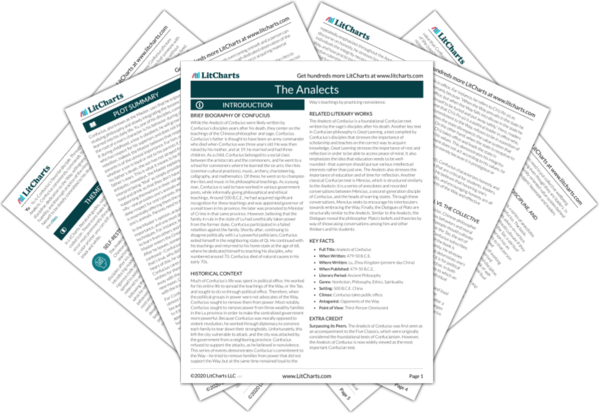The Analects of Confucius is a complication of Chinese philosopher and politician Confucius’s teachings collected together by Confucius’s disciples after his death. The teachings are aimed at introducing readers to “the Way,” also known as the Tao, a rigorous code of moral conduct that Confucius wished to spread to political officials and laypeople alike. Confucius, also referred to as “the Master” in the Analects, believed that by following the Way, men could achieve moral purity, becoming what he refers to as “gentlemen.” One of the most important behaviors that Confucius encourages people to cultivate is self-restraint both in terms of acquiring possessions and in terms of seeking social status and recognition for one’s work. Through detailing these types of self-control over the course of the book, Confucius shows how restraint is necessary to help people morally improve not only themselves but their communities.
The main type of self-restraint Confucius emphasizes throughout the Analects is material restraint. Confucius continually praises seekers of the Way for being willing to live without material luxury or even comfort. In Book 1, he says, “The gentleman seeks neither a full belly nor a comfortable home.” Here, Confucius immediately establishes a definition of “gentleman” that is different from what readers might expect. Often, the word “gentleman” refers to men of relatively high socioeconomic status who, secondary to their wealth, have refined tastes and behaviors. However, Confucius completely eliminates wealth as one of the aspects that makes a gentleman, instead associating this distinguished status with self-control and inner strength and fortitude. In doing so, he clearly communicates that morality rather than wealth is what makes a gentleman, and that restraining from accumulating wealth (or even comfort) may be a form of morality in itself. Confucius further valorizes self-restraint when he says, “It is not easy to find a man who can study for three years without thinking about earning a salary.” The way Confucius phrases this statement—by saying that it isn’t easy to find someone with that quality—suggests that the willingness to study without earning is a rare and valuable trait. At the time Confucius lived, it was advantageous for those who wished to be appointed as state officials to study the cultural rites and rituals that formed part of the Way. Confucius is likely referencing those who study the Way with only future material gain in mind and whose primary motivation for studying is earning the salary of a government official. The ideal student of the Way, according to this saying, studies because he believes that studying has inherent moral value—and embodying this ideal means being able to exercise self-restraint when it comes to material acquisition.
Confucius also encourages people to exercise self-restraint when it comes to seeking social status and recognition. At the end of the first book, Confucius says that one should not be upset by “the failure of others to appreciate [one’s] abilities.” As a teacher, one of Confucius’s main roles in life was training his students to cultivate moral abilities. However, in this quote, he emphasizes that recognition for one’s abilities should not be the main motivator behind behaving honorably or learning. In asking his students to adopt this mindset, Confucius encourages them to exercise not just material restraint, but to also restrain their egos which compel them to seek recognition for their abilities. Confucius again highlights the importance of restraining the ego through the following anecdote. In Book 5, it Confucius “[tells] Ch’i-tiao K’ai to take office. Ch’i-tiao [says], ‘I cannot trust myself to do so yet.’ The Master [is] pleased.” Here, Confucius is likely pleased because Ch’i-tiao reveals that he values perfecting his understanding of the Way more than he values the prestige that would accompany assuming a position in public office. In other words, Ch’i-tiao demonstrates both material restraint (since it’s likely that he would make a high salary as an official) and egoic restraint by declining to take a high-status position.
Through recommending self-restraint both in seeking material wealth and in seeking social status, Confucius suggests that self-restraint enables his followers to be better practitioners of the Way. With self-restraint, those eager to learn the Way can be free of material or egoic motivation and they can therefore dedicate themselves completely to moral improvement.
Self-Restraint ThemeTracker

Self-Restraint Quotes in The Analects
Book 2 Quotes
“Nowadays for a man to be filial means no more than that he is able to provide his parents with food. Even hounds and horses are, in some way, provided with food. If a man shows no reverence, where is the difference?”
Book 4 Quotes
“There is no point in seeking the views of a gentleman who, though he sets his heart on the Way, is ashamed of poor food and poor clothes.”
Book 9 Quotes
“If anyone can, while dressed in a worn-out gown padded with old silk floss, stand beside a man wearing fox or badger fur without feeling ashamed it is, I suppose, Yu.”
Book 11 Quotes
The wealth of the Chi Family was greater than that of the Duke of Chou, and still Ch’iu helped them add further to that wealth by raking in the taxes. The Master said, “He is no disciple of mine. You, my young friends, may attack him openly to the beating of drums.”
Book 12 Quotes
“To return to the observance of rites through overcoming the self constitutes benevolence. If for a single day a man could return to the observance of the rites through overcoming himself, then the whole Empire would consider benevolence to be his. However, the practice of benevolence depends on oneself alone, and not on others.”
Book 14 Quotes
Tzu-lu asked about the gentleman. The Master said, “He cultivates himself and thereby achieves reverence.”
“Is that all?”
“He cultivates himself and thereby brings peace and security to his fellow men.”
“Is that all?”
“He cultivates himself and thereby brings peace and security to the people.”











